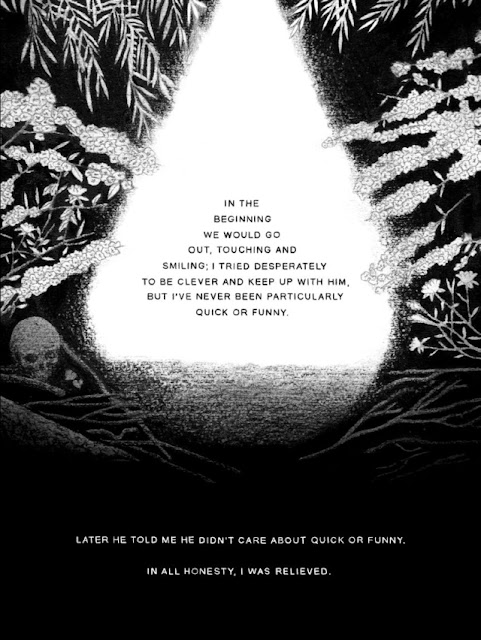So Rod Serling told us, at any rate, but there's simply no convincing the subconscious mind of that, is there? As a result, darkness, through no fault of its own, has become the go-to metaphor for negativity, depression, evil, you name it. Difficult or challenging times in life are "dark" times. The historical era dominated by superstition and anti-intellectualism is referred to as the "Dark Ages." Encroaching despair is the "darkness closing in on us."
It's primal. It's instinctive. Our rational minds know that it makes no sense, but nevertheless --- darkness isn't just symbolic of fear, it's symbolic of all fear, of the fear. The fear of losing ourselves into all-encompassing, all-devouring nothingness.
Laura Lannes understands this more intuitively than any cartoonist working today, and I say that without a moment's hesitation. Her strips in the anthologies Bad Boyfriends (which she edited) and Mirror Mirror II (which she didn't) hinted at the darkness that can slowly, inexorably creep into unhealthy relationships, but her recent solo release from Retrofit/Big Planet, John, Dear goes the full distance, charting in brief but exacting detail something well beyond the simple loss of individuality, the loss of identity, that are part and parcel of too many interpersonal relationships --- rather, her protagonist undergoes a process of complete and total self-negation the likes of which, I again say without hesitation, have never been committed to the page in so harrowing a fashion.
She meets a guy. Things seem okay at first, He's reasonably attentive and seems accepting of her flaws and foibles, but, in truth, he's silently cataloging her insecurities for later use as wedges to metaphorically burrow into her and, ultimately, hollow her out. He moves into her place with little or no discussion, bringing, figuratively and literally, almost nothing of his own. His small talk turns to cutting insults. His facile flattery morphs into neglect --- emotional, physical, sexual. And, of course, when pressed, he makes it known this is all her fault.
Somewhere along the way, subtly at first, of course, the body horror starts. Something is wrong with this young woman's physical form, strange changes are happening to her, clearly and inarguably an external manifestation of her inner turmoil. It's hinted, as these grotesque transformations escalate, that maybe it's only happening in her mind, but you know what? Even if that's the case, it's no less real. Her thoughts, her feelings, her wishes, her self --- they're all slipping away. And the darkness that's been bleeding in from the margins is starting to consume her being even as she becomes utterly unrecognizable to herself.
For some, I would suppose, interjecting the visceral horror of bodily mutation (let's just call it what it is) into a psychodrama plenty terrifying enough on its own terms may seem too heavy-handed, too obvious, but don't doubt for a moment that, thanks to the quiet power of Lannes' graphite illustrations and the absolute precision of her sparse text, it not only works, it's absolutely essential to the proceedings. The changes undergone increase in their severity even as the imagery is increasingly taken over by shadow, until shadow becomes complete and inescapable blackness, the woman whose loss of everything she was, is, ever will be subsumed from without precisely at the moment she's consumed from within.
Needless to say, comics (or, if we want to be precise about this book's format, illustrated short stories) don't get more soul-shattering than this, but Lannes also understands, intuitively, the seductive power of the darkness she's both channeling and utilizing here, so much so that there is most certainly an uncomfortably seductive quality to her horrifically beautiful (a contradiction in terms only on paper, I assure you) drawings --- and this slow seduction becomes a key component of the narrative itself, the ease with which one is drawn into the dark communicating so much of our protagonist's fracturing, shattering state of mind. Less-confident cartoonists would rely, no doubt clumsily, on the text to convey this --- Lannes has no need for such a crutch.
In point of fact, it's entirely fair to say that Lannes' aesthetic choices do something more than tell a story: they approximate, as closely as possible, the experience her character is going through within the mind of the reader. Lannes’ deft deployment --- in an artistic sense, and for entirely different purposes --- mirrors many of the same techniques of the emotional and psychologically manipulative abuser lulling us, with something less than our consent but no actual resistance on our part, into what we know, from the outset, will be as far from a "happy ending" as one can possibly imagine.
There's absolutely no way that the crafting of John, Dear could have been anything other than a fucking terrible experience --- it's too powerful, too searing, too authentic not to have come from a place of deep understanding. The act of exorcizing it must have left its own series of intensely-painful scars. It certainly leaves plenty of 'em on the reader. And yet, as portrayals of abuse go, they don't come any more realistic than this.
Putting work this personal and this demanding in terms of its execution out into the world for others to experience is an act of bravery in and of itself, one for which Lannes is to be not just applauded but thanked --- but don't for a moment go into it thinking that just because it's one of the most unforgettable, and frankly best, comics in recent memory that it's anything other than one of the most challenging, unsettling, even devastating. This book is the abyss that doesn't just gaze back --- it sucks you in and swallows you whole. Even, yes, when you read it with all the lights on.
--------------------------------------------------------------------------------------------------
Ryan Carey lives and works in Minneapolis, Minnesota. He writes about comics for Daily Grindhouse, Graphic Policy, and at his own blog. He also maintains a long-running film review blog, Trash Film Guru.






No comments:
Post a Comment